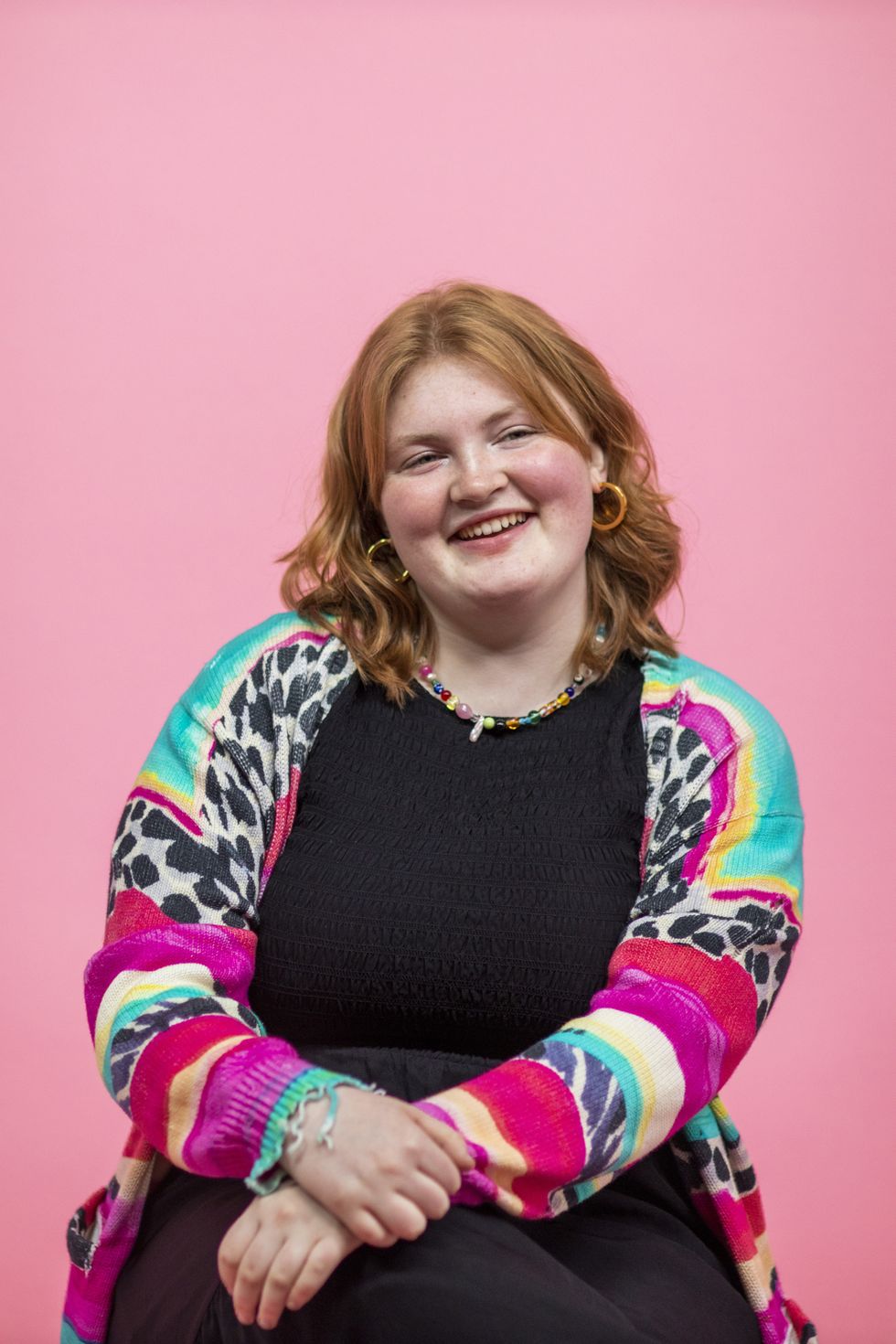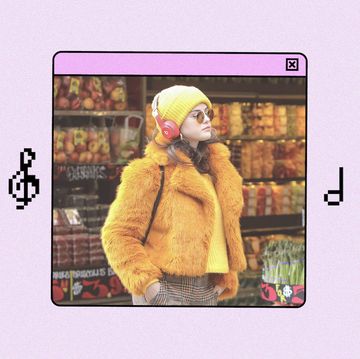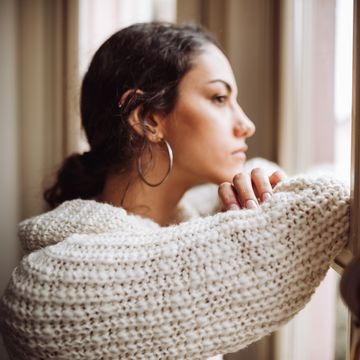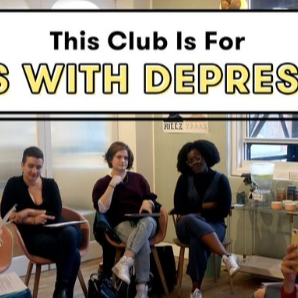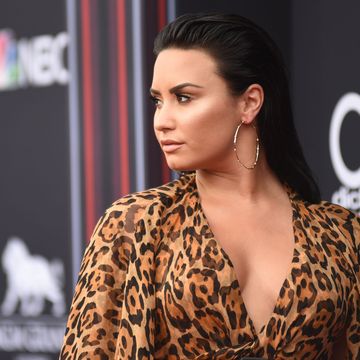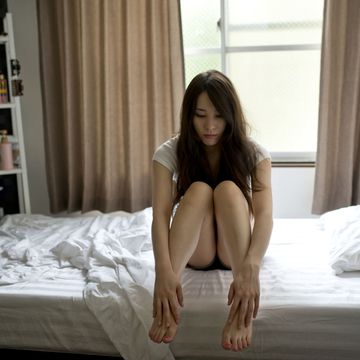What seemed to be another gloomy Tuesday in NoMad, New York City turned out to be an eventful day full of love and light at Blonde Studios where a team made up of a hairstylist, makeup artist, wardrobe stylists, editors, creative directors, videographers, and creators joined forces to put together a colorful shoot that was just as vivid and complex as the individuals behind Our Era. During the COVID-19 pandemic, Lucy Ivey decided that young people deserved a creative space where they could gain valuable experience in writing, editing, photography, and artistic collaboration. She was just 15 years old when she birthed, her own magazine, Our Era. The publication has taken to new heights since it was founded two years ago.
"I turned to a lot of people I knew at the time when I was like 14. I founded a nonprofit called Teens Speak Up and it helped make sure teenagers could speak about issues they're passionate about. We started a podcast and then it led to a site where people could do op-eds and everything," Lucy explained to Seventeen. "That kind of started my passion for editorial writing, and then there were a lot of creative people on that team and I told them about this idea I had for Our Era and some of them came along."
Our Era's 18-year-old features editor, Ella Edwards, also explained that people reach out to their team in hopes of joining — including herself when she made the move to the east coast from Los Angeles. "I personally reached out because when I moved to New York and I started college, I really missed working for a magazine," Ella tells Seventeen.
Now 18, Lucy has spearheaded collaborations with brands like Steve Madden for Our Era, which has featured an impressive lineup of cover stars like TikTok sensation Emmy Hartman, High School Musical: The Musical: The Series star Dara Reneé, and indie musician Claud. Next up on their features roster is a foursome of Instagram creators who use their platforms to promote positivity and encourage their followers to prioritize their mental health. The Gen-Z magazine has joined forces with queer Asian-American artist Kim Saira, artist and writer Tauri Janée, spiritual creator Mikah Jones, and queer indigenous Inuk Serqininguak Ketura to have open conversations about intentionality online, or the purpose behind their posts and how it affects their mental health.
"Intentionality to me means making sure that you're consuming content that is good for you and taking care of yourself on the internet in the way that if you're following someone who doesn't bring you joy or makes you compare yourself... it's important to maybe mute those people and be mindful about how much time you're spending on social media," Lucy explains.
Ella adds that the team at Our Era feels they should be providing Gen-Z with effective resources that cater specifically to them. "We're creating content for a generation that spends so much time on their phone, so we have a responsibility to those people to make sure they're consuming content that services them, helps them, and uplifts them. This collaboration with Instagram is really important because it's coming from the people that they're trying to cater towards."
As for the creators featured on the covers of Our Era's special issue in collaboration with Instagram, Lucy recalls the process of seeking them out and why they were the perfect fit. "These four creators really stuck with us because of how they create their content and their interest in art. Their takes on mental health were really, really interesting," she says.
Kim Saira echoes that sentiment, sharing that she was drawn to the project because of each creator's different point of view when it comes to mental health and how that journey looks different for Black, brown, and queer folks. "I think that whatever healing means to someone might not mean the same to someone else. So, I really love the fact that Our Era and Instagram are shining a light on Black and brown voices and what our wellness looks like," Kim tells Seventeen. "I really appreciate having that amplification to younger audiences because it's something that I feel like I definitely would've liked when I was a lot younger."
Each featured creator has their own lane when it comes to their content — for instance, Mikah encourages wellness through live guided meditations while Serqininguak shares a lot about purpose and what that means for indigenous Peoples. Meanwhile, Kim and Tauri turn to art forms like graphic design, writing, and dance to spread awareness about mental health and prioritizing wellness.
"[Content creation] has encouraged me to create distance between myself and social media. I value my well-being and I realize that creating space between myself and the virtual world serves me well," Tauri explains. "Of course, I still value the relationships and the opportunities that have presented themselves and the connections that form on these platforms. But I've learned that those things are equally as accessible offline and that there are other ways for me to feel affirmed."
A 2019 survey by the American Psychological Association found that Gen-Z is more likely to report they have fair or poor mental health. It also revealed that Gen-Z is more likely to report they have received treatment from a mental health professional or gone to therapy. Ashley Thompson, the 19-year-old photographer behind the Our Era x Instagram cover shoot, credits Gen-Z's continuous transparency on social media for encouraging individuals to seek help. "Obviously, mental health has been an issue for however long we've been alive but I think that our generation has been the most indulged in social media," Ashley tells Seventeen. "Everyone has started sharing so much and having all these platforms to share on that they've been able to talk about where they're at mentally." She also explains that the rise of social media platforms has helped people speak out and create a domino effect where a community is formed and others feel comfortable in their own transparency.
"I think that knowing that there are people who can resonate with what you're going through is very reassuring. It's so important to ask for help because you can't handle [certain struggles] on your own. Like, you can tell yourself you can, but you really can't," Lucy adds.
As for navigating our own mental health journies, Ella suggests that progress isn't linear and that as complex individuals, we're allowed to feel certain emotions. "You need to allow yourself to be angry and you need to allow yourself to make mistakes. Above all else, allow yourself to change. If you're the same person that you were a year ago, then nothing happened — no change was made," she says. "You aren't supposed to know everything right away and you should allow yourself to have those dips because you're always gonna come out the other side and learn something from it."
Our Era's special issue with Instagram about intentionality online is available now. Read all four cover stories at www.oureramag.com.
Credits
Studio: Blonde Studios
Photographer: Ashley Thompson
Our Era Graphic Designer: Charlie Sue Birznieks
Stylist: Bernadet Davood with assistance from Tatiana Dominguez
Producer: Lucy Ivey
Production assistant: Ella Edwards
Hair: Mariah Molina
Makeup: Danielle Parkes
On-set assistant: Hannah-Mia Hinds
Sam is an assistant news editor at Cosmo, covering all things pop culture, entertainment, and celebrity news. She previously covered those same topics along with health, lifestyle, and beauty at Seventeen. When she isn't draping her cheeks in blush, you can probably find her live-tweeting awards shows or making SwiftToks.

